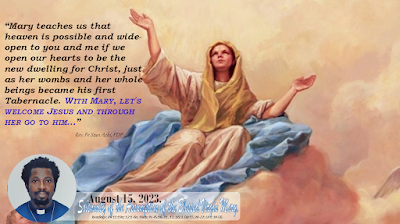THERE IS STILL GOODNESS IN CREATION.
August 15, 2023.
Solemnity of the Assumption of the Blessed Virgin Mary.
Readings: Rv 11:19a; 12:1-6a, 10ab; Ps 45:10, 11, 12, 16; 1Cor 15:20-27; Lk 1:39-56.
“Mary set out and traveled to the hill country in haste…” Lk
1:39
A Filipino proverb says: “Beauty will fade, but not
goodness.” And an Ivorian proverb adds: “Man's goodness is a flame that can be
hidden but never extinguished.”
It will sound quite strange to read the title of our today's
meditation, while we are called to reflect on the Solemn elevation of Mary, the
Mother of our Lord and God into heaven. One could ask, what is the link between
Mary’s Assumption and the creation?
This goes to the events that gave rise to this feast, the
historical background of the dogmatic declaration of the Assumption of Mary. It
is said that Catholics believe that God assumed Mary’s body into heaven.
Byzantine Christians call today her “dormition” or “falling asleep.” Others
call today her “harvesting” into heaven. But here we go, Pope Pius XII declared
the assumption a dogma of the faith in 1950 to remind us that creation is good,
following years of war, the Holocaust, and nuclear destruction. Creation is
good. We are good.
On November 1, 1950, Pope Pius XII defined the Assumption of
Mary to be a dogma of faith: “We pronounce, declare and define it to be a
divinely revealed dogma that the immaculate Mother of God, the ever Virgin
Mary, having completed the course of her earthly life, was assumed body and
soul to heavenly glory.” What the Pope solemnly declared was already a common
belief in the Catholic Church. But the context in which he proclaims it is the
most important. The world was getting out of the sorrowful time of the 1st and
2nd World Wars. A new hope was springing from the ashes of destruction and
ruins. And this hope rose with fervent popular devotion.
In "MUNIFICENTISSIMUS DEUS", the Holy Father
affirms, "The most bountiful God, who is almighty, the plan of whose
providence rests upon wisdom and love, tempers, in the secret purpose of his
own mind, the sorrows of peoples and of individual men by means of joys that he
interposes in their lives from time to time, in such a way that, under
different conditions and in different ways, all things may work together unto
good for those who love him.
Now, just like the present age, our pontificate is weighed
down by ever so many cares, anxieties, and troubles, by reason of very severe
calamities that have taken place and by reason of the fact that many have
strayed away from truth and virtue. Nevertheless, we are greatly consoled to
see that, while the Catholic faith is being professed publicly and vigorously,
piety toward the Virgin Mother of God is flourishing and daily growing more
fervent, and that almost everywhere on earth it is showing indications of a
better and holier life. Thus, while the Blessed Virgin is fulfilling in the
most affectionate manner her maternal duties on behalf of those redeemed by the
blood of Christ, the minds and the hearts of her children are being vigorously
aroused to a more assiduous consideration of her prerogatives." MD 1.2
Mary arose into heaven, bringing to our Lord and Savior our
sorrows, but also the most beautiful side of our humanity. In her humility, she
pleads for sinful humanity to be restored to its original beauty and goodness
lost in sin.
The Catechism, after the paragraph of the dogmatic
declaration says: "The Assumption of the Blessed Virgin is a singular
participation in her Son's Resurrection and an anticipation of the resurrection
of other Christians: In giving birth you kept your virginity; in your Dormition
you did not leave the world, O Mother of God, but were joined to the source of
Life. You conceived the living God and, by your prayers, will deliver our souls
from death." CCC. 966 So, the Assumption is not as much a celebration of
Mary for herself, but a celebration of our humanity called to rediscover her
goodness and beauty in Christ. For, with Mary, we too, are called to
participate in the glory of Christ's Resurrection. Heaven is possible, and Mary
shows us the way through her humble and obedient life to God’s will.
After all the battles and trials we go through here on
earth, a crown of glory awaits us in heaven above. The only condition is that
we keep faith in the Lord and remain obedient to his will. We are urged to
learn from Mary the childlike humility and the selflessness that could help us
to say like her, "Behold, I am the handmaid of the Lord. Let it be done to
me according to your word." Lk 1:38.
Our first reading tells the glory of Mary in heaven. "A
great sign appeared in heaven: a woman clothed with the sun, and the moon
beneath her feet, and on her head a crown of twelve stars." Rev 12:1. So,
"Let us all rejoice in the Lord, as we celebrate the feast day in honor of
the Virgin Mary, at whose Assumption the Angels rejoice and praise the Son of
God." (Cf. Entrance antiphon) With Mary, may we every day echo our
heartfelt gratitude and thanksgiving to the Lord, a perpetual Magnificat for
the greatness of the Lord. It is only at that cost, will we also be brought to
the glory of the Resurrection as the first fruits of those who belong to
Christ.
Mary teaches us that heaven is possible and wide-open to you
and me if we open our hearts to be the new dwelling for Christ, just as her wombs
and her whole beings became his first Tabernacle. With Mary, let's welcome
Jesus and through her go to him.





Comments
Post a Comment